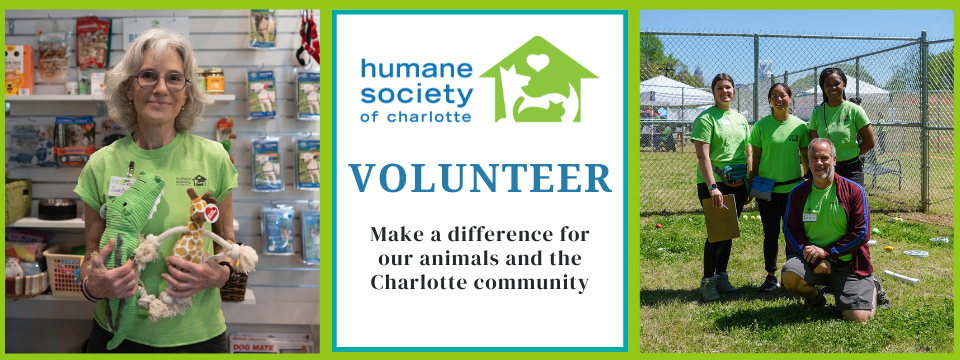Love animals AND kids, want to help educate our youth in animal welfare and more?! Than this is the volunteer opportunity for you!
Help the Youth Programs Manager in facilitating school visits, shelter tours, field trips, scout presentations and other education related programs. Attend events with your HSC evaluated Animal Ambassador to engage children of all ages in a variety of topics relating to animal welfare. This role will vary depending on the content of the topic being taught and the location of the programming (shelter setting, school setting, etc.)
To become a Qualified YP Animal Ambassador Handler you must successfully complete the following steps:
- Your pet must be up to date on RV, DA2PP and Bordetlla. You must be up to date on the COVID-19 vaccine. *A background check MAY be required to attend certain school grounds** After reading all the requirements and you feel that you and your animal are eligible, please email Tim Stumpff tstumpff@humanecharlotte.org to set up an evaluation appointment.
- Director of Education will collect basic info from applicant and schedule an evaluation interview with applicant and the evaluation team (Team consists of the Behavior and Training Coordinator, Youth Program Coordinator and Director of Education. The applicant will bring their dog with them to the interview.
- During the interview the evaluation team will interview the applicant using the evaluation questionnaire (attached), these questions are provided to the applicant prior to the interview.
- The Behavior and Training Coordinator will then assess the dog using the Animal Ambassador Testing Items (attached).
The evaluation team will come to an agreement on if the applicant is accepted to be an AAH and will notify the applicant of their decision within 72 hours Background checking may be required
Below is a general overview of HSC’s Youth Animal Ambassador Evaluation Process. This process should take an estimated 20-30 minutes.
At any point, the animal cannot show signs of aggression, fearfulness, extreme stress or anxiety or else they are considered unqualified for the position. Aversive equipment such as shock collars (a.k.a. e-collars); pinch/prong collars; and choke collars are not permitted at any time.
In addition, the use of inhumane and forceful training methods, including but not limited to shocking, hitting, alpha rolling (pinning a dog down using force), and hanging from the collar are absolutely not permitted.
The handler may have a treat pouch and give the dog treats during the process; however, the handler cannot use treats to lure or distract the dog in any way. Treats can only be given after a part has been completed and must be out of sight at all times. Any sound producing items (such as clickers or beepers) are prohibited.
Head halters, slip leads and retractable leashes are prohibited. Harnesses are allowed as long as they do not restrict the dog’s movement in any way.
The animal must be at least 6 months old, up to date on all vaccinations, house-trained and have known history of socialization with people. There are no breed, gender, or age limit restrictions. Any animal with a bite history is not eligible for the program; however, exceptions can be made on a case-by-case basis dependent on the reported injuries, details of the incident, and steps made to prevent future incidents.
If the animal does not pass the evaluation process, they are permitted to try again after a period of two-four weeks, depending on the reason(s) the animal was not qualified.
Evaluation is completed at The Humane Society of Charlotte by The Behavior and Training Team. Parts of the tests are done both indoors and outdoors, weather permitting. The handler is not permitted to have a helper during the evaluation and must complete it on their own. During some parts of the evaluation, the evaluator will require the assistance of a helper/helpers. These helpers can be HSC staff members and/or HSC volunteers.


